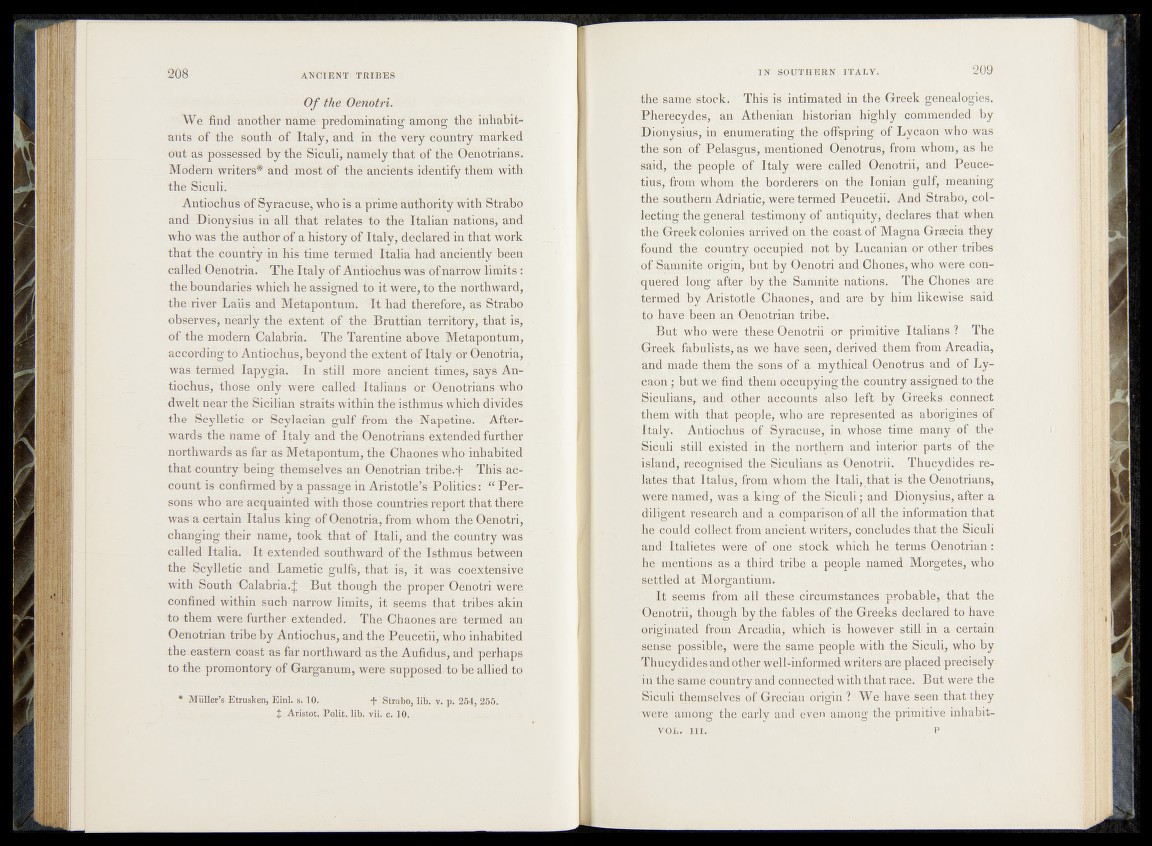
ó f the Oenotri.
We find'another name predominating amorig the inhabitants
of thei; south of Italy, and in the very country marked
out as possessed by the Sieuli, namely that of the:Oenotriaris.
Modern writers* and most of the ancieuts identify thehi with
the Sieuli.
Antioch us of Syracuse, who is a prime authority with Strabo
and Dionysius in all that relates to the Italian nations, and
who was the author of a history of Italy, declared in that work
that th e country in his time termed Italia had anciently been
called Genotria. The I taly Of Antiochus Was of narrow limits:
the boundaries which he assigned to it were, to the north,ward,
the-river Laiis and Mèfapontum. It had therefore, as Strabo
observesj nearly the extent of the Bruttian territory, that isy
of the modern Calabria. The Tarentine abo¥è Mëfcapontum,
according-to Antiochus, beyond the extent Of Italy'ör 0ènotria,
was termed Iapygia. In still more ancient times, 'kéfè Antiochus,
those; only were called Italians or Oenotriins "who
dwelt near the Sicilian straits within theisthmu^ which divides
the Scylletic or Scylacian gulf from the Na|téfme. '^Afterwards
the name o f Italy and theGenotriansrextended further
northwards as far as Metapontum, the Chaojiès who inhabited
th a t country being thëffiselves an Oenotrian triberj;: ThlS^c-
count is confirmed by a passage in Aristofle’s-Politicpl “ Persons
who are acquainted with those countries report that there
waê^a cmfain ltalüs king of Oéüotria, from whom t t e Qgncrtri,.
changing their nameytook that of Itali, and the country was
called Italia. It-extended southward of the Isthmus between
the Scylletic and Lametic gulfs, that is, it was coextensive
with South ’Calabria.J But though the proper Oénotri were
confined within such narrow limits, it séems that tribes akin
to them were further extended. The Chaones are termed an
Oenotrian tribe by Antiochus, and the Peucetii, who inhabited
.the eastern coast as far northward as the Aufidus, and perhaps
to the promontory of Garganum, were supposed, to be allied to
* Mfiller’s Etrusken, ÏSinL s, 1 0 , + Strafed, life v. p. 254, 255.
.; J Aristot. Polil^Ub. vii.- c. 10.
the same^s'tock. This is intimated in the Greek genealogies.
Pherecydgs, an Athenian historian highly commended by
DLopysius, in enumeratjpg the offspring of Lvcaon who was
the son of Pelasgus, mentioned Oenotrus, from whom, as he
the1 people pf Italy were called Oenotrii, and Peuce-
fius, from whom thé ' borderers*oh 'the Ionian‘gulf, meaning
the son^hertn Adriatic, ^ere'dtermed Peucetii. And Strabo, col-
Reefing'the general testimony of antiquity^ declares that when
th é ^ fe e k colonies arrived^ on the cpast of Magna Grascia they
fpupd the country ppciapied npt by Lucapian or other tribes
of Samniie origin, but by. Oenotri and Chotfes, who were conquered
, long after ^y^th^Samnite nations. - The Chones: are
■^rn^ed .by Aristot-ll||)haqnes,' and are by 'him likewise said
fm havo';‘be,en''an Oenotrian tribe. * ;
' < „ But who^yestedhese Oenotrii"or primitive-Italians ? The
Cheek fabulists^ as we "have seen, derived-them from Arcadia,
and made them/the sons of a mythical OenotyUs and of Ly-
daon ; but^we^fifid them occupying t^e-fC^untry assigned to the
-piculians,.,arldyother |j>féöaünt SllMsq left by-Greeks ^connect
dheftij- with ^ th a t'^ ip ïe , whó'aré'. represented as aborigines of
Ita fe Antiochois^of Syraeus|j^i$8whose time -many, of the
loculi still< existed in the northern -»and interior, pafts^of-the
Hand-,«-recognised the Siculians as Oenotrii. Thuovdide» re-
|a t é |' that ItaIus|;from whom the Itali, that is the Oenotrians,
%ere named,, king, of theySjculi-; and DiOnysius, after a
.^jj^epj.researtii1 and-^eOmparisqfi:óf ^ ]|th e information that
he coulddpllécüfrom ancient writers, concludes that the Sieuli
apd Italietes. were oGonè' stock which he terms Oepotrian:
he ^mentions as. a third tribe* a people named Morgetes, who
feet tied at Morgantium.
It seems from all these circumstances' probable,- that the
Oenotrii, though by, the fables of the Greeks declared to have
originated from Arcadia, which'is ho wever Isf/ill* i n a certain
•seiise. possibly Were'the same people with the Sieuli, who by
Thucydides and other well-informed wrif©M&re placed precisely
in the same country and cqiniiected with that race. But weré the
-Sibüli themselves e f Greciairörigin ? We have seen that they
We're among-' the èarly aafPeVen 'amétïg :the primitive inhabit-
VOL. III. v p